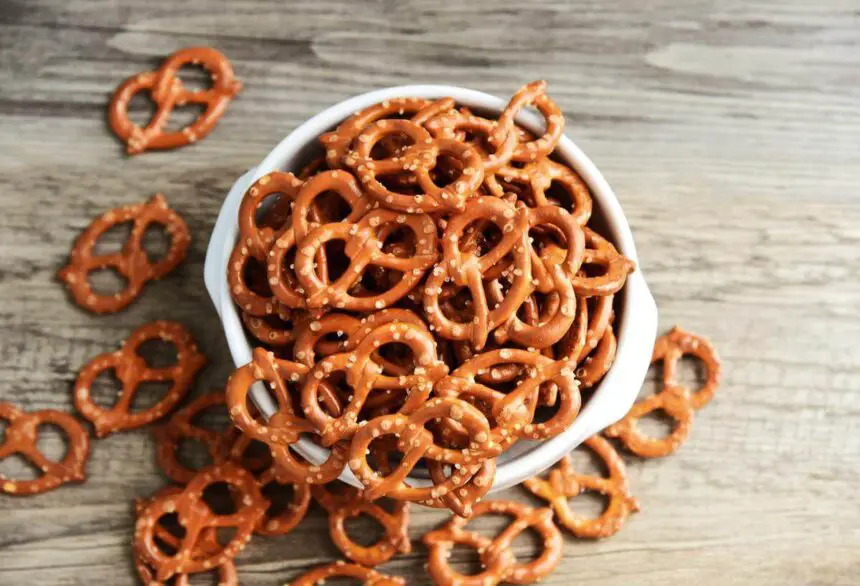As pet owners, we often find ourselves tempted to share our favorite snacks with our beloved feline friends. Pretzels, with their crunchy texture and savory flavors, may seem like a harmless treat to offer to your cat. However, it’s crucial to understand that cats have specific dietary needs that differ significantly from our own. In this article, we will explore the question: Can cats eat pretzels? We’ll delve into feline nutrition, potential risks, and safer alternatives to ensure the well-being of your furry companion.
Understanding Feline Nutritional Requirements
Cats are obligate carnivores, which means their bodies have evolved to thrive on a diet primarily consisting of meat. Their nutritional needs are different from omnivorous animals, like humans, who can digest a variety of plant-based foods. Cats require a diet rich in high-quality animal proteins, essential amino acids, fatty acids, and specific vitamins and minerals.
The Risks of Feeding Pretzels to Cats
Lack of Nutritional Value
Pretzels are primarily made from refined wheat flour, salt, and other seasonings. They lack the essential nutrients that cats need for optimal health, such as taurine, arachidonic acid, and vitamin A. Feeding pretzels to cats can lead to imbalances and deficiencies in their diet, which can have long-term health consequences.
High Sodium Content
Pretzels are often salted, making them high in sodium. Cats have a lower tolerance for salt compared to humans. Excessive sodium intake can lead to electrolyte imbalances, kidney problems, and increased thirst and urination. Cats are prone to kidney issues, and feeding them salty foods can exacerbate these problems.
Potential Allergies and Digestive Issues
Wheat, one of the main ingredients in pretzels, is a common allergen for cats. Feeding pretzels to a cat with wheat allergies can cause gastrointestinal upset, including vomiting, diarrhea, and discomfort.
Choking Hazards
Pretzels have a hard, crunchy texture that can be challenging for cats to chew and swallow properly. There is a risk of choking or gastrointestinal blockage if a cat ingests a large piece or if fragments of the pretzel become lodged in their throat or intestines.
Additives and Seasonings
Many pretzels are flavored with herbs, spices, or artificial additives like onion or garlic powder, which can be toxic to cats. These ingredients can cause gastrointestinal irritation, anemia, and damage to red blood cells.
Safer Treat Options for Cats
While pretzels are not a suitable snack for cats, there are healthier alternatives that you can offer to satisfy their desire for treats:
Commercial Cat Treats
Look for high-quality cat treats specifically formulated to meet feline nutritional needs. These treats are designed to be nutritionally balanced and come in various flavors and textures to cater to different preferences.
Cooked Meat
Lean, cooked meats like chicken, turkey, or fish can be a tasty and nutritious treat for cats. Ensure that the meat is thoroughly cooked, boneless, and free from seasonings, spices, and added oils.
Catnip or Cat Grass
Many cats enjoy the effects of catnip or chewing on cat grass. These options are safe and can provide mental stimulation and entertainment for your feline companion.
Feline-Specific Snacks
Some pet stores offer specialized snacks for cats that are both delicious and nutritionally appropriate. These snacks are formulated with the specific dietary requirements of cats in mind.
Homemade Treats
If you enjoy baking, you can find recipes online for homemade cat treats using cat-friendly ingredients such as canned tuna, cooked chicken, or baby food formulated for cats. These homemade treats can be a fun and creative way to provide your cat with a special snack while ensuring their nutritional needs are met.
Tips for Responsible Treat Giving
Moderation is Key
Treats should only make up a small portion of your cat’s overall diet. Excessive treat consumption can lead to weight gain and nutritional imbalances. Follow the recommended guidelines provided by the treat manufacturer or consult your veterinarian for appropriate portion sizes.
Consider Individual Needs
Each cat is unique, and their dietary requirements may vary based on factors such as age, weight, and health conditions. If your cat has specific dietary restrictions or allergies, consult with your veterinarian before introducing any new treats into their diet.
Monitor for Allergic Reactions
When introducing new treats, observe your cat for any signs of allergic reactions or digestive issues. If you notice vomiting, diarrhea, excessive scratching, or any other abnormal symptoms, discontinue the treat and consult your veterinarian.
Stay Hydrated
Ensure that your cat has access to fresh, clean water at all times, especially when offering treats. Hydration is vital for their overall well-being and can help prevent urinary tract issues.
Avoid Table Scraps
While it may be tempting to share your own snacks with your cat, it’s important to refrain from feeding them table scraps. Many human foods can be toxic or harmful to cats, including chocolate, onions, garlic, grapes, and raisins. Stick to treats specifically designed for feline consumption.
Conclusion
While pretzels may be a tasty snack for humans, they are not suitable or nutritionally beneficial for cats. Cats have unique dietary requirements, and their bodies are designed to thrive on a meat-based diet. Feeding pretzels to cats can lead to nutritional imbalances, digestive issues, and potential health risks. It’s crucial to prioritize their well-being by offering them appropriate, nutritionally balanced treats specifically formulated for feline consumption. When in doubt, consult your veterinarian for guidance on the best treat options for your furry friend. Remember, a healthy diet is the foundation of a long and happy life for your cat.


